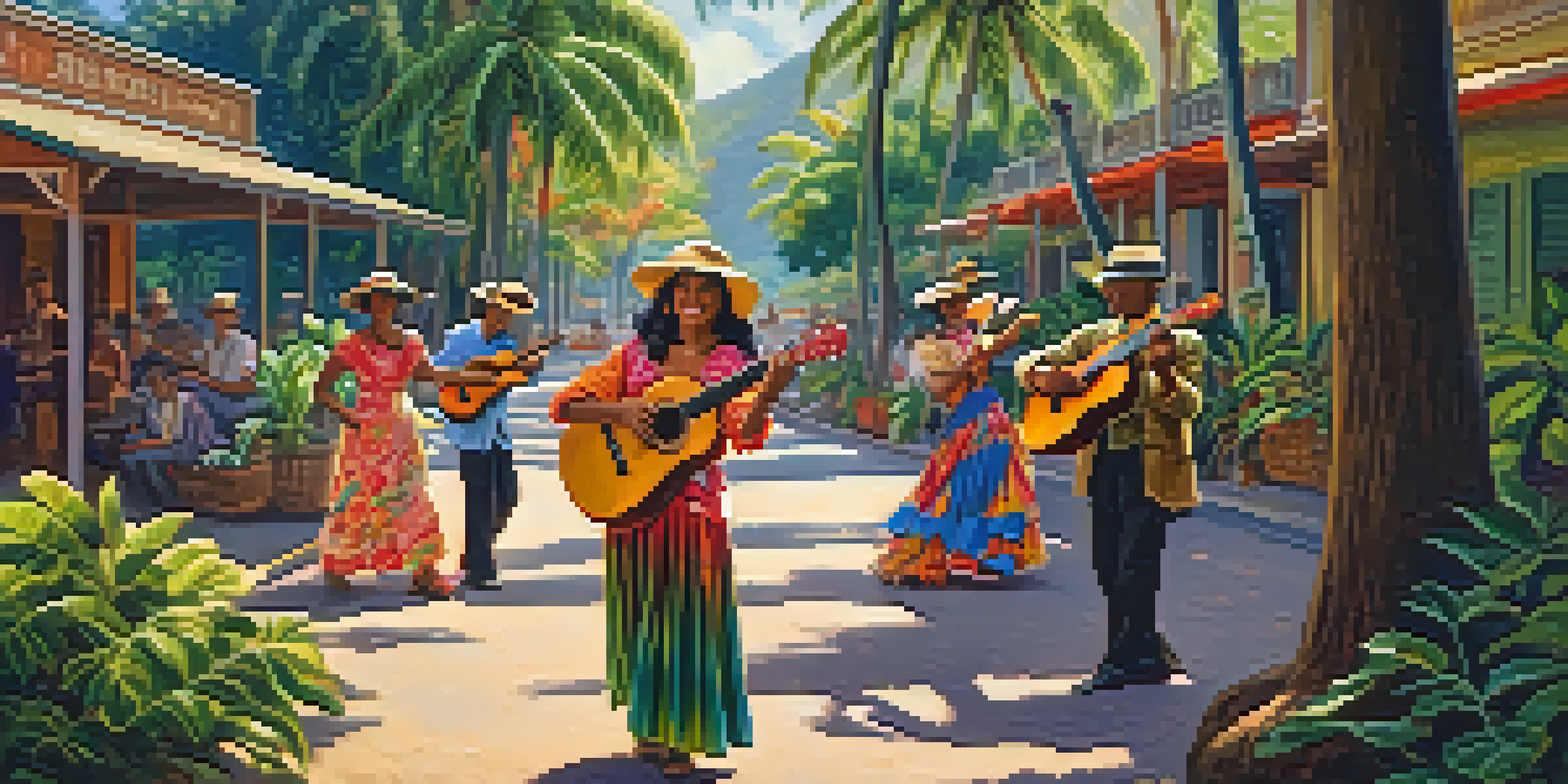The Role of the Ukulele in 20th Century American Music

The Ukulele's Origins and Early Influence in America
The ukulele, a four-stringed instrument originating from Hawaii, made its way to the mainland United States in the late 19th century. Its cheerful sound and portability quickly captured the hearts of American musicians and audiences alike. By the early 20th century, the ukulele became a staple in popular music, particularly during the vaudeville era, where performers showcased its bright tones.
The ukulele is a small instrument with a big heart.
Musicians like George Formby popularized the ukulele in the 1920s, blending it with folk and pop melodies. This period saw the instrument being featured in numerous recordings, further embedding it in the fabric of American music. The ukulele's accessibility made it appealing to amateur musicians, contributing to its rise in popularity across diverse musical genres.
Furthermore, the ukulele became a symbol of the carefree spirit of the Roaring Twenties. Its incorporation in jazz ensembles and dance bands reflected the era's vibrant culture, allowing audiences to escape the hardships of daily life through music. This laid the groundwork for the ukulele's enduring legacy in American music.
The Ukulele's Resurgence in the 1930s and 1940s
The 1930s and 1940s marked a significant resurgence for the ukulele, coinciding with the popularity of swing music and big bands. Artists like Cliff Edwards, known as 'Ukulele Ike,' brought the instrument back into the limelight with their catchy tunes and engaging performances. The ukulele's unique sound added a distinct flavor to the music of the time, making it a favorite among both musicians and listeners.

During this period, the ukulele found its way into mainstream radio shows and films, further amplifying its visibility. The instrument was often featured in musical numbers, enhancing the entertainment value of many productions. This exposure introduced the ukulele to new audiences, establishing it as a beloved instrument across the nation.
Ukulele's Popularity in Early America
The ukulele became a beloved instrument in the early 20th century, capturing the hearts of musicians and audiences with its cheerful sound.
Additionally, the ukulele became a symbol of optimism during the Great Depression, providing a sense of joy and escapism. People turned to music as a source of comfort and connection, and the ukulele, with its lighthearted melodies, became a beacon of hope. This emotional resonance solidified the ukulele's place in American music history.
The Ukulele in the Folk Music Movement
As the 1960s rolled around, the ukulele found a new home within the folk music movement. Artists such as Pete Seeger and The Kingston Trio embraced the instrument, incorporating it into their performances to evoke a sense of nostalgia and simplicity. The ukulele's straightforward nature made it an ideal choice for folk music, which often emphasized storytelling and communal experiences.
Music is the universal language of mankind.
The folk revival brought the ukulele to the forefront of social movements, as musicians used it to convey messages of peace and unity. Its easy playability allowed many to join in, fostering a sense of togetherness among audiences. This accessibility helped to democratize music, making it possible for everyday people to express themselves through song.
The impact of the ukulele during this era was profound, as it became a tool for social change. Songs performed on the ukulele often addressed pertinent issues, resonating with listeners and inspiring action. This shift not only revitalized interest in the instrument but also showcased its versatility across various musical styles.
The Ukulele's Role in the Rise of Rock and Roll
While the ukulele may not have been the primary instrument in rock and roll, it certainly played a supporting role in the genre's evolution during the 1950s and 1960s. Many rock musicians began to incorporate the instrument into their songs, adding a unique twist to their sound. Bands like The Beach Boys used the ukulele to create harmonious melodies that defined the surf rock movement.
The ukulele's cheerful tone contrasted with the often rebellious spirit of rock and roll, providing a delightful juxtaposition. This blend of styles attracted a diverse audience, as listeners appreciated the fusion of upbeat sounds with more intense themes. The instrument's presence in rock music showcased its adaptability, allowing it to transcend genres.
Resurgence in the Late 20th Century
The late 20th century saw a renewed interest in the ukulele, driven by artists and the internet, introducing it to a new generation.
Moreover, the ukulele's use in rock and roll highlighted its enduring appeal across generations. As new artists emerged, they continued to experiment with the instrument, keeping its legacy alive. This ongoing incorporation of the ukulele into modern music demonstrates its lasting influence on American cultural expression.
The Ukulele's Resurgence in the Late 20th Century
The late 20th century saw a resurgence of interest in the ukulele, as musicians from various genres began to explore its possibilities. Artists such as Israel Kamakawiwo'ole and his iconic rendition of 'Somewhere Over the Rainbow' introduced a new generation to the instrument. His heartfelt performances showcased the ukulele's emotional depth, inviting listeners to connect with its sound.
This resurgence was amplified by the rise of the internet and social media, which allowed enthusiasts to share their love for the ukulele worldwide. Online tutorials and communities blossomed, making it easier for aspiring musicians to learn the instrument. This accessibility contributed to a global ukulele craze, with festivals and gatherings celebrating its charm.
The late 1990s and early 2000s also saw the emergence of ukulele-focused bands and artists, further solidifying its place in contemporary music. From indie pop to alternative rock, the ukulele found its way into a variety of musical landscapes. This new wave of ukulele music continued to captivate audiences, ensuring the instrument's relevance in modern American music.
The Ukulele in Contemporary Music and Pop Culture
Today, the ukulele enjoys a prominent position in contemporary music and pop culture. It has been embraced by a diverse range of artists, from Taylor Swift to Bruno Mars, showcasing its versatility across genres. The instrument has become synonymous with upbeat, catchy tunes, adding a distinctive flair to modern hits.
Moreover, the ukulele's presence in popular media has contributed to its resurgence. Television shows, movies, and viral videos have all featured the instrument, introducing it to new audiences. This exposure has created a sense of nostalgia while simultaneously appealing to younger generations, bridging the gap between past and present musical expressions.
Cultural Impact and Future Outlook
The ukulele's cultural significance and adaptability suggest its continued relevance in contemporary music and its potential for future growth.
The instrument's appeal lies not only in its sound but also in its accessibility. With its lightweight design and easy learning curve, the ukulele invites people of all ages to pick it up and play. This has fostered a vibrant community of ukulele enthusiasts, ensuring that the instrument remains an integral part of American music culture.
The Ukulele's Cultural Significance and Future
As we reflect on the ukulele's journey through 20th-century American music, it's clear that this humble instrument carries significant cultural weight. Its ability to evoke emotion, foster connection, and inspire creativity has made it a beloved tool for musicians and audiences alike. The ukulele transcends barriers, bringing people together through the universal language of music.
Looking ahead, the future of the ukulele appears bright. With its resurgence in popularity, more artists are likely to incorporate the instrument into their work, further expanding its reach and influence. The ongoing interest in music education also suggests that the ukulele will remain a go-to instrument for beginners, ensuring its legacy continues for generations to come.

In conclusion, the ukulele's role in 20th-century American music is a testament to its enduring charm and adaptability. As it continues to evolve, the ukulele will undoubtedly remain a cherished part of the musical landscape, inspiring creativity and joy in countless individuals.